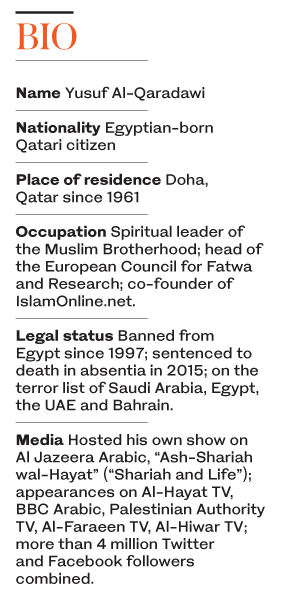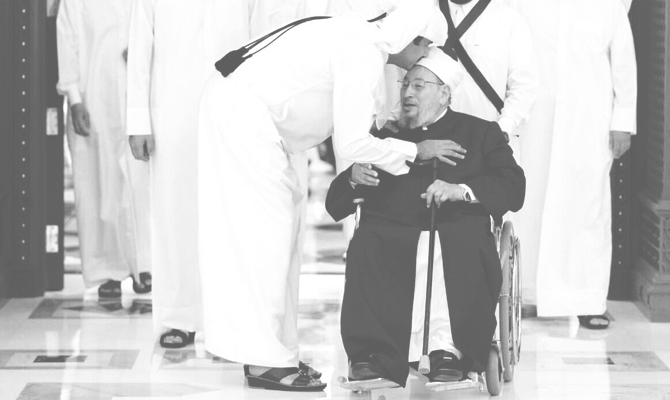JEDDAH: Yusuf Al-Qaradawi is next in our series “Preachers of Hate.” He is one of the fountainheads of the Muslim Brotherhood, the religious-political organization that has been sanctioned and proscribed by Gulf states and many Western countries.
The Brotherhood’s followers are accused of fanning religious hatred and promoting a cult of violence in order to achieve political power.
 In a recent tweet, Al-Qaradawi claims that he is not a preacher of hate and that he spent 25 years promoting moderate thought.
In a recent tweet, Al-Qaradawi claims that he is not a preacher of hate and that he spent 25 years promoting moderate thought.
“I stood against extremism and extremists for approximately a quarter of a century. I saw its threat to deen and dunya (religion and the temporal world), on the individual and society, and I have reinforced my pen, tongue and thought (to support) the call for moderation and reject exaggeration and negligence, either in the field of fiqh and fatwa (Islamic jurisprudence and legal pronouncement in Islam) or in the field of tableegh and da’wah (guidance and preaching),” he tweeted.
But his track record reveals exactly the opposite. He has justified suicide bombings, especially in Palestine, has repeatedly spoken out against Jews as a community, and has issued fatwas (religious edicts) that demean women.
In a fatwa on his website, he states that martyrdom is a higher form of jihad. In a 2005 interview on the BBC’s “Newsnight” program, he praised suicide bombings in Israeli-occupied Palestine as martyrdom in the name of God. “I supported martyrdom operations, and I am not the only one,” he said.
He encourages Muslims who are unable to fight to financially support mujahideen (those engaged in jihad) everywhere in foreign lands.
This can hardly be described, according to what he says in his tweet, as a stand against terrorism.
Al-Qaradawi has issued fatwas authorizing attacks on all Jews. On Al Jazeera Arabic in January 2009, he said: “Oh God, take Your enemies, the enemies of Islam … Oh God, take the treacherous Jewish aggressors … Oh God, count their numbers, slay them one by one and spare none.” He has a similar disdain and a deep-seated hatred of Europeans.
On his TV show in 2013, broadcast from Doha to millions worldwide, Al-Qaradawi lambasted Muslim countries as weak, and called on citizens to overthrow their governments and launch a war against all who oppose the Brotherhood, describing them as “khawarij” (enemies of Islam).
A revolt against then-Egyptian President Mohammed Morsi, who hailed from the Brotherhood, began on June 30, 2013.
That Al-Qaradawi is an Islamic supremacist, and has total disdain for Europe and its culture, can be gauged from one of his lectures on Qatar TV in 2007. “I think that Islam will conquer Europe without resorting to the sword or fighting. Europe is miserable with materialism, with the philosophy of promiscuity and with the immoral considerations that rule the world — considerations of self-interest and self-indulgence,” he said. “It’s high time (Europe) woke up and found a way out from this, and it won’t find a lifesaver or a lifeboat other than Islam.”
Observers in the Middle East are perplexed by Qatar’s support and granting of citizenship to an incendiary ideologue such as Al-Qaradawi, especially since Doha claims that it is fighting terrorism.
One of the major reasons for the Anti-Terror Quartet — comprising Saudi Arabia, the UAE, Egypt and Bahrain — boycotting Qatar is Doha’s promotion of terrorism and its active support to terrorists.

When the late Al-Qaeda leader Osama bin Laden became a menace to world peace, and when he unleashed terrorism in different parts of the world, Riyadh took the logical step of stripping him of his Saudi citizenship.
Political observers feel that Qatar should have done something similar in Al-Qaradawi’s case. He is a renegade cleric who was accused of ordering the assassination of political figures in his home country Egypt, and who was sentenced to death in absentia.
Qatar should have handed him over to Egypt, but it did not. Instead, it granted him citizenship.
In a 2017 exclusive interview with Arab News on the sidelines of the Doha Forum, Qatar’s Foreign Minister Sheikh Mohammed bin Abdulrahman Al-Thani was asked why his country continued to support Al-Qaradawi. His answer was instructive. “He is a Qatari citizen who carries Qatari nationality, and an elderly individual, and thus we cannot tell him to depart Qatar,” Al-Thani said. “The Qatari constitution does not allow for the submission of any Qatari citizen to foreign judiciary, be it in an Arab or non-Arab country.”
Salman Al-Ansari, founder of the Saudi American Public Relation Affairs Committee, refers to the Law of Political Asylum, promulgated by Qatar.
He said this grants terrorists and extremists certain privileges under the pretext of asylum, “the most important of which is escape from legal pursuits.”
To all intents and purposes, he added, the law gives terrorists the right to residency and Qatari citizenship, and the ability to move freely between states using false names and nationalities.

















